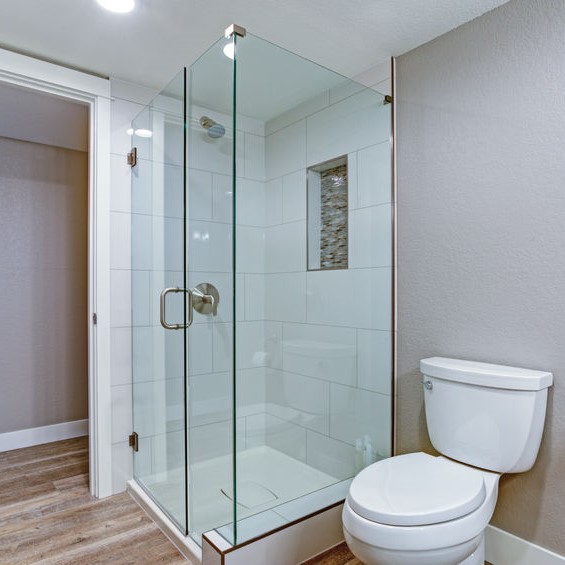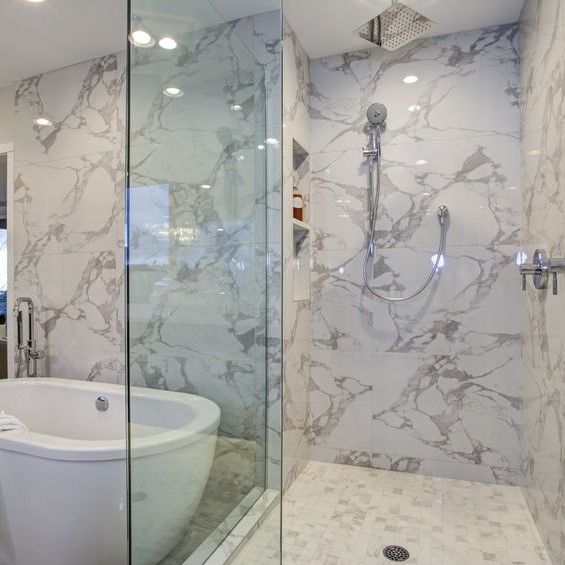
Are walk in showers a good idea?
If you watch enough television, you’ve seen the commercial for handicap showers installation recently. Maybe you’re watching those commercials and thinking to yourself, who would need that, and why? There could be any number of reasons why these are gaining popularity.
It could be from an accident or simply just getting older, but for many people, taking a bath or shower isn’t as easy and relaxing as it once was. It is the simple pleasures in life you miss when your mobility becomes restricted. Handicap showers and bathtubs give you that simple pleasure in life to end your day and relax.
In recent years, watching home remodeling and renovation shows, the kitchen and bathroom are the main focus. These are two areas that a family will spend most of their time. In the kitchen, a prevalent remodeling trend is the farmers’ sink, and in the master bathroom, the trend is a walk-in or handicap showers or baths.
What are the benefits of these handicap showers? Are there benefits to reconfigure the current shower and bath setup for this conversion? Here are some pros that can help you get some insight into why handicap showers and baths are heading to be the norm instead of the exception:
Elegance Understated
If you’re remodeling or renovating a bathroom, you want it to be modern and stylish, and handicap shower with no door and threshold offer that while they seamlessly blend in with the rest of the bathroom. These are the big and clunky things you’ve seen in the hospital rehab and therapy rooms. You can install a handicap shower and bathtub with an interconnected facade that will unify without creating a distraction.
Improved Accessibility
Baby boomers are the most significant part of the population right now. We are also the majority of homeowners, and we’re at a time in our lives where we can afford and have time for remodeling and renovating our homes. We are also getting older! And while we’re getting older, our mobility is becoming more limited. So, to make our home we love so dearly more accessible, these handicap showers and bathtubs are a must! If we haven’t fallen and broken a hip yet, and we have the option to remove one of the dangers in our home, then why not?
Easy Cleaning
Again, baby boomers are looking at what makes life easier as we get older. Not only are handicap showers an elegant and safe addition to our remodeled bathrooms, but they are also easier to clean than you may think. There nooks and crannies are fewer, the surface is smooth nonporous, making it easier and faster to clean. Albeit decorative, gone is the shower curtain that gets dingy and moldy.
What are ADA requirements?
Today, thanks to the Americans with Disabilities Act (ADA), there are required guidelines on everyday things like bathtubs and handicap showers. In addition to the dimensions, which we will discuss next, the ADA sets requirements to be standard in every public goods and service in all commercial and public buildings. Those things are carrying over into homes today, like the handicap shower requirements.
What is the size of a handicap shower?
There are two styles of handicap showers that must meet specific interior dimensions:
ADA Transfer Shower
- These handicap showers are designed for a person to safely transfer themselves from their wheelchair to the wall-mounted handicap shower seat and have easy access to the shower controls while seated. The ADA Guidelines specify for the inside shower dimension to be 36” x 36” with a threshold to be half an inch above the finished floor.
ADA Roll-in Shower
- These handicap showers are designed for wheelchair accessibility into the shower. The ADA Guidelines specify the inside shower dimension to be 60” x 30” or larger so that there is enough room for the wheelchair-bound person to enter the shower in their wheelchair. The threshold must be half an inch high above the finished bathroom floor.
Additionally, handicap showers and baths must have handicap shower bars to help with getting up and down, in and out of the shower or bath.

Does a walk in shower add value?
Walk-in showers today are designed to meet the various needs of every household. For a household with children or elderly occupants, safety is a crucial factor that handicap showers provide. Low step-in height, built-in, contoured seating, and anti-slip flooring are vital features, and overall ADA-compliant design can make your home stand out on the market.
When you factor in upgrades like heated floors and luxury tile or beautiful laminate flooring that mocks the appearance of luxury tile, walk-in handicap showers are that value-add item that can make the difference that sells your house at the full asking price.
The most common question for seniors that are considering the benefits of handicap showers and baths is, “Will Medicare pay for a handicap shower?”. The simple, straight answer is no. Medicare does not pay for handicap showers and bathtubs. The longer answer, they may reimburse part of the cost after it has been installed. Maybe.
There isn’t any guarantee that you’ll get a partial reimbursement, but there is a guarantee you won’t get fully refunded. Sorry, that isn’t what you want to hear, but it is the truth. It doesn’t cost anything more to ask for reimbursement, so make sure you do this the right way after the installation is complete.
First, get your doctor to prescribe handicap showers for you. If you want Medicare to reimburse you for anything, you need a doctor’s prescription, and handicap showers are no different than wheelchairs. Next, you need to shop around for quotes and choose the best one for your needs that you can afford without Medicare’s assistance. The cost should include the remodeling needed because handicap showers and tubs have different requirements in space and plumbing fixtures. Once you make the purchase and the install is complete, you need to make multiple copies of your doctor’s prescription and detailed invoice. Mail it all to the address on your Medicare card and wait. If they do send you a check for partial reimbursement, you can use that money to add-on and upgrade some of the accessories and handicap shower ideas you’ve been checking. Call 817-937-6267 today for expert glass installation.
